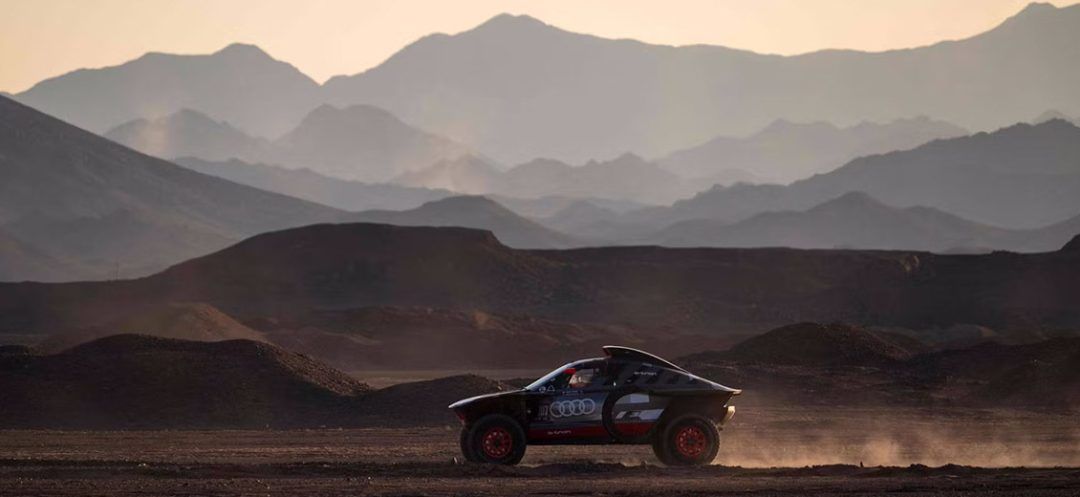
Audi's Mattias Ekstrom was fastest on Friday on the 27km Dakar Rally prologue raced over the desert sands of Al-Ula in Saudi Arabia.
Double defending champion Nasser Al-Attiyah made a slight detour and ended the day 12th.
January is the coolest month in the often searing region with temperatures at 23C (over 40C in July) with almost no wind to blow up the sand and a very low level of humidity.
Swede Ekstrom set a time of 16min 30sec, some 23sec ahead of the American Seth Quintero of Toyota, making his debut at this level.
"I wanted to prove that I was there to play in the big leagues," said the 21-year-old Quintero who joined Toyota to replace Al-Attiyah, winner of the last two editions, who left for Prodrive this season.
"It worked very well, there were a lot of traps but we did well."
French veteran Sebastien Loeb came in third at 38sec in a promising start after his second place overall in 2023.
The times do not count towards the overall standings but instead provide a choice of starting position for Saturday's opener.
"That wasn't easy," said the nine-time world champion Loeb, who is yet to win a Dakar.
"It was a tough choice to either attack the course or manage the deficit. In the end I attacked and it worked out okay," he said.
Prodrive's Brazilian brothers Marcos and Cristian Baumgart rounded out the top five.
Al-Attiyah brushed off his mishap of 12th place at 1min 01sec saying he was getting used to the new car.
"Twelth is a good place," he said.
Spaniard Tosha Schareina on a Honda took the honours on the motorbikes, finishing the prologue 12secs ahead of Daniel Sanders' GasGAs with Hero rider Ross Branch a further seven seconds behind.
Title holder Kevin Benavides, achieved the day’s ninth best time, a little less than one minute behind the winner.
Saturday's opening stage is a punishing 414km run over sand and grey rock as it winds through a volcanic region that remains largely unexplored by the rally, starting from Al-Ula to Al Henakiyah.
Sunday's stage 2 is contested over tough jagged-stone sections and vast expanses of sand dunes. The 8,000km long 12-stage marathon ends at the Red Sea January 19.
The 46th running of the event may be called the Dakar, but the last time the Senegalese capital actually hosted the finish was way back in 2007 - the security situation in Mauritania forced the 2008 cancellation.
It moved then to South America until finding a new home in Saudi Arabia since 2020.
Double defending champion Nasser Al-Attiyah made a slight detour and ended the day 12th.
January is the coolest month in the often searing region with temperatures at 23C (over 40C in July) with almost no wind to blow up the sand and a very low level of humidity.
Swede Ekstrom set a time of 16min 30sec, some 23sec ahead of the American Seth Quintero of Toyota, making his debut at this level.
"I wanted to prove that I was there to play in the big leagues," said the 21-year-old Quintero who joined Toyota to replace Al-Attiyah, winner of the last two editions, who left for Prodrive this season.
"It worked very well, there were a lot of traps but we did well."
French veteran Sebastien Loeb came in third at 38sec in a promising start after his second place overall in 2023.
The times do not count towards the overall standings but instead provide a choice of starting position for Saturday's opener.
"That wasn't easy," said the nine-time world champion Loeb, who is yet to win a Dakar.
"It was a tough choice to either attack the course or manage the deficit. In the end I attacked and it worked out okay," he said.
Prodrive's Brazilian brothers Marcos and Cristian Baumgart rounded out the top five.
Al-Attiyah brushed off his mishap of 12th place at 1min 01sec saying he was getting used to the new car.
"Twelth is a good place," he said.
Spaniard Tosha Schareina on a Honda took the honours on the motorbikes, finishing the prologue 12secs ahead of Daniel Sanders' GasGAs with Hero rider Ross Branch a further seven seconds behind.
Title holder Kevin Benavides, achieved the day’s ninth best time, a little less than one minute behind the winner.
Saturday's opening stage is a punishing 414km run over sand and grey rock as it winds through a volcanic region that remains largely unexplored by the rally, starting from Al-Ula to Al Henakiyah.
Sunday's stage 2 is contested over tough jagged-stone sections and vast expanses of sand dunes. The 8,000km long 12-stage marathon ends at the Red Sea January 19.
The 46th running of the event may be called the Dakar, but the last time the Senegalese capital actually hosted the finish was way back in 2007 - the security situation in Mauritania forced the 2008 cancellation.
It moved then to South America until finding a new home in Saudi Arabia since 2020.
Read more



Comments